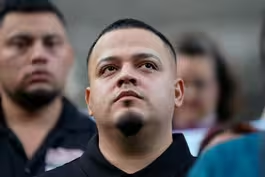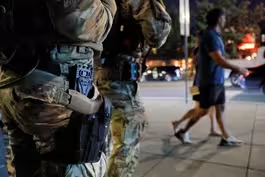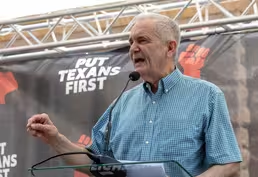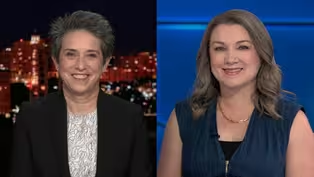
5 journalists killed after Israel strikes Gaza hospital
Clip: 8/25/2025 | 8m 10sVideo has Closed Captions
Another 5 journalists killed after Israel strikes Gaza's largest hospital
A pair of Israeli strikes on a Gaza hospital killed five journalists and more than a dozen others, including first responders. Some of their deaths occurred on live television in what Israel called a "tragic mishap." This incident follows strikes that killed six journalists in Gaza City two weeks ago, the single deadliest day of the war for those covering it on the ground. Stephanie Sy reports.
Problems playing video? | Closed Captioning Feedback
Problems playing video? | Closed Captioning Feedback
Major corporate funding for the PBS News Hour is provided by BDO, BNSF, Consumer Cellular, American Cruise Lines, and Raymond James. Funding for the PBS NewsHour Weekend is provided by...

5 journalists killed after Israel strikes Gaza hospital
Clip: 8/25/2025 | 8m 10sVideo has Closed Captions
A pair of Israeli strikes on a Gaza hospital killed five journalists and more than a dozen others, including first responders. Some of their deaths occurred on live television in what Israel called a "tragic mishap." This incident follows strikes that killed six journalists in Gaza City two weeks ago, the single deadliest day of the war for those covering it on the ground. Stephanie Sy reports.
Problems playing video? | Closed Captioning Feedback
How to Watch PBS News Hour
PBS News Hour is available to stream on pbs.org and the free PBS App, available on iPhone, Apple TV, Android TV, Android smartphones, Amazon Fire TV, Amazon Fire Tablet, Roku, Samsung Smart TV, and Vizio.
Providing Support for PBS.org
Learn Moreabout PBS online sponsorshipAMNA NAWAZ: A pair of Israeli strikes on a hospital in Gaza this morning killed five journalists, along with more than a dozen others, including first responders.
Some of their deaths occurred on live television in what Israel called a -- quote -- "tragic mishap."
This incident follows Israeli strikes that killed six journalists in Gaza City just two weeks ago, the single deadliest day of the war for those covering it on the ground.
Stephanie Sy has our report.
STEPHANIE SY: From the rubble of a stairwell at Nasser Hospital, Gaza's largest medical facility, news crews cover the aftermath of a deadly Israeli airstrike.
A witness holds up camera equipment coated in blood and dust.
"Journalism, journalism," he shouts.
First responders crammed into a stairwell try to reach the wounded.
Three more journalists circled in this freeze frame arrived on the scene, and then a second deadly strike.
The journalists were killed, along with more than a dozen civilians and first responders, in the back-to-back strikes on Nasser Hospital.
Colleagues and families sought comfort.
ADLI ABU TAHA, Brother of Moaz Abu Taha (through translator): Take a picture of me, guys.
We worked together so much, yet I never even took one picture with him.
STEPHANIE SY: Palestinian reporters and camera men and women tell the stories of violence and suffering in Gaza and have often become the story themselves.
Mariam Dagga, 33 years old, was a visual journalist who freelanced for several news organizations, including the Associated Press.
She and others often reported from Nasser Hospital to cover Gazans injured in the war.
Recently, her lens had shifted more towards Gaza's growing starvation.
Dagga was killed in the second strike, along with fellow freelancer Moaz Abu Taha and Al-Jazeera's Mohammed Salama.
Reuters confirmed cameraman Hussam al-Masri was killed apparently in the first strike.
A fifth journalist, Ahmed Aziz, died later of his wounds.
The Israeli prime minister's office issued a statement, calling it a tragic mishap, saying it values the work of journalists and medical staff.
Israel's military expressed regret and said it would investigate.
BRIG.
GEN. EFFIE DEFRIN, Israeli Defense Forces Spokesperson: We are aware of reports that harm was caused to civilians, including journalists.
Reporting from an active war zone carries immense risk, especially in a war with a terrorist organization such as Hamas, who cynically hides behind the civilian population.
STEPHANIE SY: At least 192 journalists have lost their lives in Gaza since the war began, according to the Committee to Protect Journalists.
By comparison, only 18 journalists have been killed in Russia's 3.5-year war in Ukraine.
The world relies on local Palestinian journalists for information, since Israel has banned international news professionals from covering the war in Gaza.
News organizations, including PBS News, obtained footage and reporting by contracting with Palestinian journalists who live in Gaza.
At a funeral for their colleagues today, those very journalists vowed to keep documenting and bearing witness to the war.
IZZ EL-DIN AL-MASRI, Brother of Hussam al-Masri (through translator): The cameras will not be turned off.
God willing, the cameras won't turn off.
They will not be absent from the public scene.
We will continue to pursue the image everywhere.
STEPHANIE SY: Joining me now to discuss the continued threats to journalists in Gaza is Azmat Khan, a Pulitzer Prize-winning reporter herself.
She is also the head of the Li Center for Global Journalism at Columbia University and joins us tonight from Ramallah in the occupied West Bank.
Azmat, it's good to have you on the "News Hour."
Gaza, as you know, has seen one of the deadliest periods for journalists in modern history, but it is just one of the deadliest places on the planet as well right now.
Officials say some 60,000 people have been killed in Gaza.
You have researched civilian deaths by airstrikes.
Put these journalists' deaths into context for us.
AZMAT KHAN, Investigative Reporter: Right.
We have never seen numbers like this in terms of journalists killed in airstrikes, in targeted attacks, in ways that have gone unexplained and underinvestigated.
But, at the end of the day, we have seen this from the very beginning of this war.
Since November 3, 2023, CPJ's numbers showed that, in that time period since the war started, they had never seen such a deadly period for journalists.
And this has been a pattern over and over and over.
On October 13, 2023, another Reuters journalist was killed, Issam Abdallah, while he was running a live feed for Reuters.
Today, we saw the exact same thing happen.
And this has been a case after case after case where we have seen a pattern of killing unlike anything else.
It surpasses anything I have ever seen in any war zone.
And, at the end of the day, it is the journalists that we rely on to tell us this story, to be our eyes and ears on the ground when we cannot get in, people who are risking their lives every day who've gone unprotected.
And we have failed to prevent this.
It's a failure by our industry.
STEPHANIE SY: Israel denies, Azmat, that it targets journalists on purpose.
You called it a pattern.
And just two weeks ago, an Al-Jazeera correspondent, Anas Al-Sharif, was killed.
The Israeli military, in that case, released some screenshots of documents showing he had worked for Hamas in the past.
Azmat, what do you think of that type of justification, which Israel has given on other occasions as well?
AZMAT KHAN: So there's a great deal of evidence of Anas' work as a journalist.
And in this case, you can see that he was working as a journalist, and Israel targeted him.
That is targeting a journalist.
They claim he has had prior affiliations.
But by that same logic, that would make anyone, if true, right, which this evidence, we have yet to see it for ourselves -- they also made new claims about promoting Hamas rockets, again, evidence we have yet to see.
But if this is the logic that we are supposed to be using in how people are targeted, by that same logic, you could target somebody who had previously worked for or had previously been in a military and became a journalist.
And I think that's a really, really dangerous precedent to set.
it endangers all of us.
More than that, I think it's really important to know the very savvy network that Israel has relied upon.
It includes its own so-called legitimization cell, a cell that's intentionally been created to contrive allegations against journalists and deflect from its killing of journalists and, in essence, its killing of truths.
Now, there are cases where -- there are at least 26 cases that CPJ has tracked where it has identified instances in which it believes that journalists were explicitly targeted.
We have seen cases where journalists who were flying drones, an essential part of their operations, were targeted for that very reason, for using drones to capture video footage.
All of this really, really requires us to ask ourselves, how did we get to a place where such numbers have become acceptable?
It is no longer surprising.
How did we get to a place where allegations about links to Hamas are able to circulate so effectively that they make the entire conversation about an unprecedented number of journalists and journalists who work for outlets that we rely upon for news coverage that we use every day, how is that not the story?
And we really need to ensure that killing journalists doesn't kill the story.
Is a bubble forming as AI investments drive economic growth?
Video has Closed Captions
Clip: 8/25/2025 | 7m 44s | Is a bubble forming as AI investments drive economic growth? (7m 44s)
Kilmar Abrego Garcia's attorney on new deportation effort
Video has Closed Captions
Clip: 8/25/2025 | 7m 7s | Kilmar Abrego Garcia's attorney discusses his case amid new deportation effort (7m 7s)
A look why presidents can control D.C.'s law enforcement
Video has Closed Captions
Clip: 8/25/2025 | 6m 55s | A look at D.C.'s unique history and why presidents can wield control of law enforcement (6m 55s)
Rep. Doggett on redistricting and pushback against Trump
Video has Closed Captions
Clip: 8/25/2025 | 7m 12s | Democratic Rep. Doggett on Texas redistricting battle and party's pushback against Trump (7m 12s)
Tamara Keith and Amy Walter on Newsom's fight against Trump
Video has Closed Captions
Clip: 8/25/2025 | 9m 55s | Tamara Keith and Amy Walter on whether Newsom's tactics against Trump are working (9m 55s)
Providing Support for PBS.org
Learn Moreabout PBS online sponsorship
- News and Public Affairs

FRONTLINE is investigative journalism that questions, explains and changes our world.

- News and Public Affairs

Amanpour and Company features conversations with leaders and decision makers.












Support for PBS provided by:
Major corporate funding for the PBS News Hour is provided by BDO, BNSF, Consumer Cellular, American Cruise Lines, and Raymond James. Funding for the PBS NewsHour Weekend is provided by...




